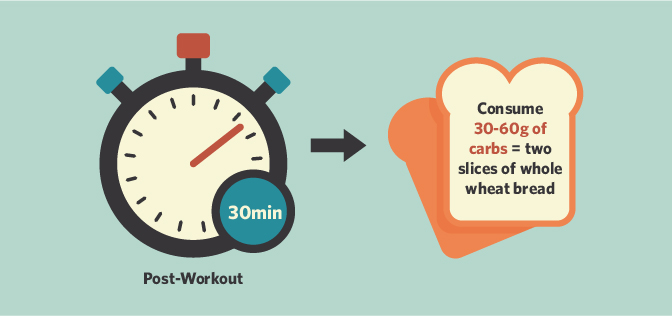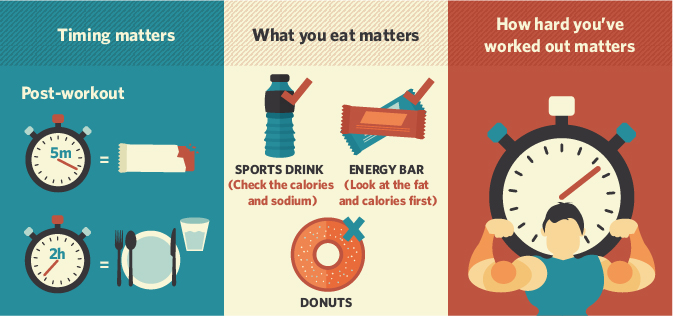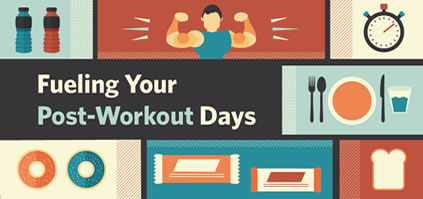Fueling Your Post-Workout
What you eat after a hard exercise session may impact the next day’s training
Last Tuesday began for me like so many other week days: Up at 5 a.m. for a five-mile run
with some friends, home by 6 and into the shower, then tag-teaming with my wife to nudge
our kid up and out the door with a packed lunch and school bag by 7:45. By the time I sat
down at my desk it was almost 8:15: I had been up for over three hours and hadn’t yet had
breakfast.
That’s often the case, not just for me, but for any busy person: Distracted, over-scheduled,
or just not hungry, post-workout fueling can often be an afterthought, if a thought at all. On
those very busy mornings, between stomach growls and to-do lists, I sometimes have a passing moment
of panic: Have I just undone all the exercise-related good I did for my body by skipping the right
post-workout fuel?
As with so many things related to health and well-being, the answer is: Yes, maybe, but it depends.
What’s happening post-workout
If you’ve worked your muscles hard enough while exercising—and I’m not talking a stroll for a
mid-morning coffee—you’ve done a couple of things. You’ve spurred your body to use up some energy
stores in the form of fat. You’ve also depleted your sugar reserves, and torn muscle fibers, which,
counter-intuitively, stimulates stronger muscles. So your post-exercise body is both recovering and
growing, which means it’s searching for good-quality fuel to assist with that process. That fuel
comes in the form of sugar and carbs for energy, and protein to build back the muscles that have
exerted themselves.
So about that timing…
The commonly accepted wisdom is that if you’ve worked out hard—say, a vigorous run that lasts
about 45 minutes—you need to eat within an hour or all your good deeds have been undone. Other
studies have shown that the ideal post-exercise eating window is two hours and not immediately
after exercise. But then some recent research indicates that while those guidelines are good and
important, the timing may actually be a bit more fluid.
A 2013 study in the Journal of the International Society of Sports Nutrition found that high-quality
protein—which builds strength—is important, but as it relates to what and when you’ve eaten before
you’ve worked out. In general, the study found that “pre- and post-exercise meals should not be
separated by more than approximately 3–4 hours, given a typical resistance training bout lasting
45–90 minutes.” But, the authors stressed, that timing is flexible depending on the person, the
exercise type and length, and the food.
The study also found that carbs, which help build endurance, are important, but indicated there’s no
definitive guideline on how much is needed. According to the American College of Sports Medicine, 30
to 60 grams of carbs (about two slices of whole wheat bread) eaten a half hour after a workout is best.

Post-exercise, it’s also easier for your body to gobble up sugar and transport it to your muscles
for fuel, according to the Journal of Applied Physiology. Called insulin sensitivity, this complex
process is impaired in people with Type II diabetes, making exercise even more important for everyone
in order to regulate day-to-day interactions in the body.
The post-workout food fad of the moment is chocolate milk, for a number of reasons. It’s a liquid
with carbs and protein as well as a little bit of sugar, vitamins, and calcium to boot. A 2012 study
in Medicine and Science in Sports and Exercise found that post-exercise participants who drank chocolate
milk had improved protein balance, glycogen stores, and performance. Below is a graph that illustrates
the effects of drinking milk post-exercise compared to soy and carbohydrates.
 Source: Effects of Drinking Milk Following Exercise
Source: Effects of Drinking Milk Following Exercise
So what’s the answer?
I’m in no danger of making the Olympics. But I do like to push myself with exercise and have, through
the years, increased my running mileage and my cross training. And I want to stay healthy and active my
whole life. So what’s the takeaway for average, every day people like me who workout regularly and want
to maximize the benefits?
- Timing matters. Ideally, it may be best to give your body a light carb and protein combo
right away—that 8 ounces of chocolate meal right when you finish sweating—and then a healthy
meal an hour or two later. That quick post-workout fuel helps your body build its muscle
glycogen stores, too.
- What you eat matters. That protein-carb combo is going to help you build strength and
endurance, which means that you’ll be better primed for your next workout. But quality is
important. You can’t eat whatever source of carbs and protein you can lay your hands on.
Donuts? Probably not. A sports drink? Check the calories and sodium. An energy bar? Look at
the fat and calories first.
- How hard you’ve worked out matters. If I do a quick 20-minute interval session, I probably
don’t need to worry about whether I eat right away. But post long run, even if I’m not hungry
my body is starving and I need to fuel it.

Embed the article on your site

